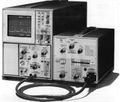7J20: Difference between revisions
No edit summary |
No edit summary |
||
| Line 35: | Line 35: | ||
==Price== | ==Price== | ||
$12,000 in 1975 ($55,000 equivalent in 2017) | $12,000 in 1975 ($55,000 equivalent in 2017) | ||
==Links== | |||
* [https://youtube.com/watch?v=7zR4Os6JEac 7J0 in operation @ VintageTek Museum] (YouTube) | |||
==Pictures== | ==Pictures== | ||
Revision as of 10:15, 14 June 2018
The Tektronix 7J20, which only appears in the 1975 catalog, is a "rapid scan" optical spectrometer for the 250 nm to 1100 nm region. Rapid scan means that it can capture the spectrum quickly enough to show spectral changes at temporal resolution of a few milliseconds.
The instrument is based on a Czerny-Turner Monochromator, in essence a narrow slit followed by a diffraction grating. A vidicon tube scans the optical spectrum and produces a periodic electric signal which is then displayed by the scope mainframe.

The spectrometer is packaged in two enclosures linked by an umbilical cable. The 7J20 is a 2-wide plug-in for 7000-series scopes containing the sweep timing and mainframe interface circuits. The external enclosure is labeled "J20". It has controls for the optical components (grating, filters etc.) on one side and an input aperture on the other.
The 7J20 is very rare. According to Dennis Tillman, Best estimate is ~40 were actually built.
Key Specifications
| Spectral range | 250 nm to 1100 nm |
|---|---|
| Resolution (Grating A) | ≤4 nm in a 400 nm span (selectable 300-700, 400-800, 500-900, 600-1000, or 700-1100 nm |
| Resolution (Grating B) | ≤0.4 nm in a 40 nm span continuously variable through the spectral range |
| Slit | 10 to 5000 μm wide (1-2-5 sequence), 10 mm high |
| Filters | ND1, ND 2, 500 nm monopass, 800 nm monopass, UV block (≤400 nm), UV pass (250-330 nm), open (no filter) |
| Scan | 10 or 20 ms base sweep, 50 to 1000 ms (1-2-5) settings run successive 20 ms sweeps up to the selected integration time |
| Display span | Grating A, 40, 20, 10 or 4 nm/Div ; Grating B, 4, 2, 1 or 0.4 nm/Div |
Price
$12,000 in 1975 ($55,000 equivalent in 2017)
Links
- 7J0 in operation @ VintageTek Museum (YouTube)
Pictures
-
7J20 (plug-in part) in 7633 mainframe
-
7J20 plug-in part and J20 spectrometer connected (catalog picture)
-
7J20 with J20 in measurement setup (catalog picture)


